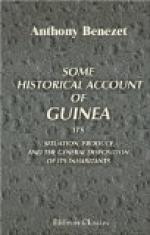[Footnote A: Collection vol. 2. p. 29.]
[Footnote B: Note, This Negroe King thus refusing to comply with the factor’s wicked proposal, shews, he was sensible his own conduct was not justifiable; and it likewise appears, the factor’s only concern was to procure the greatest number of slaves, without any regard to the injustice of the method by which they were procured. This Andrew Brue, was, for a long time, principal director of the French African factory in those parts; in the management of which, he is in the collection said to have had extraordinary success. The part he ought to have acted as a christian towards the ignorant Africans seems quite out of the question; the profit of his employers appears to have been his sole concern. At page 62, speaking of the country on the Senegal river, he says, “It was very populous, the soil rich; and if the people were industrious, they might, of their own produce, carry on a very advantageous trade with strangers; there being but few things in which they could be excelled; but (he adds) it is to be hoped, the Europeans will never let them into the secret.” A remark unbecoming humanity, much more christianity!]
[Footnote C: This inhuman practice is particularly described by Brue, in collect. vol. 2. page 98, where he says, “That some of the natives are, on all occasions, endeavouring to surprize and carry off their country people. They land (says he) without noise, and if they find a lone cottage, without defence, they surround it, and carry off all the people and effects to their boat, and immediately reimbark.” This seems to be mostly practised by some Negroes who dwell on the sea coast.]
[Footnote D: Bosman, p. 155.]




